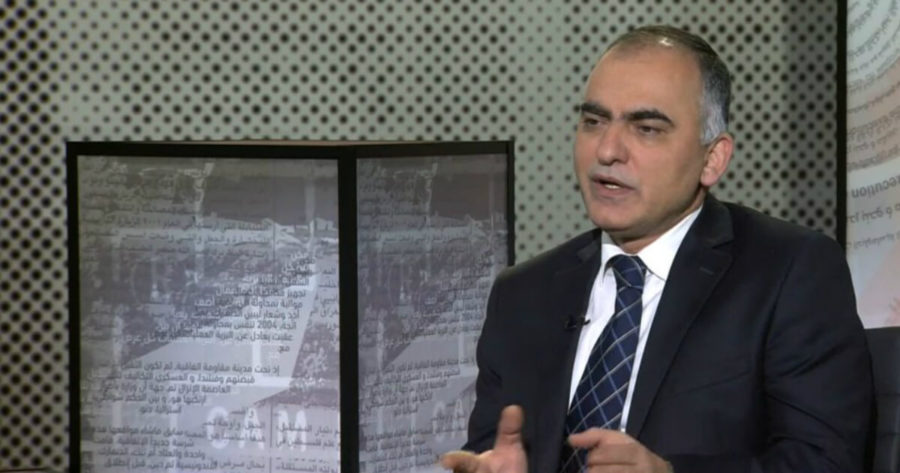
Between denouncing the assassination of the Iranian nuclear scientist Mohsen Fakhri Zadeh, who is considered “the father of the nuclear program” in Iran, and the statements issued by many officials and decision-makers in the Iranian regime as well as the reactions resulting from this attack, there is an abundance of confusion as well as a lack of synchronization or even minimal coordination in presenting a unified narrative or response to it all. Whether it is uncovering the details of the assassination or responding swiftly against this painful attack that shook the Iranian security apparatus, many days have passed as neither has occurred.
While eyewitnesses revealed the details of the assassination they saw closely, the regime’s narrative continued to flounder. The witnesses confirmed the participation of over 5 people in the attack on Fakhri Zadeh’s convoy and described how a parked car was detonated on the side of the road. Meanwhile, the Minister of Security in the Iranian government, who is the coordinator between various security apparatuses, revealed that his team had been able to obtain several leads that will help uncover the perpetrators, many of whom were said to have already left the country only few hours after the attack.
After that, the Secretary to the Supreme National Security Council, Admiral Ali Shamkhani, spoke about the Iranian agencies’ prior information about of the attack and its location. He conceded that the information was not taken seriously enough, as he denied the participation of Iranians in the attack. He also revealed the presence of a new sophisticated type of satellite guided weaponry used in the assassination.
Shamkhani’s interpretation downplayed the negligence of the security services who ignored all evidence pointing towards the possibility of such an occurrence. The interpretation also failed to provide justification for how these weapons, which were in the transport vehicle and were used in the assassination, were then destroyed and could not be reclaimed. How did they reach Iran? Who parked them on the side of the road near Fakhri Zadeh’s convoy as it was passing? Were these sophisticated satellite devices able to track their target’s movements without the help of agents on the ground?
On the political implications of the incident, two different responses were observed on two different levels of government. On the military level, there was a relatively synchronized response between the army and the Revolutionary Guard which focused on the inevitable response that will be pursued at the appropriate time and place, and that they will not be drawn into ill-considered impulsive response. On the political level, there was a clear contradiction, perhaps even conflict, regarding the measures that should be pursued. This is apparent with regard to the conservative majority parliament that quickly rushed a bill concerning governmental obligations to reduce Iran’s nuclear activities within the strategic framework that aims to uplift the sanctions imposed on the country.
The exhibition performed by Speaker of the Parliament Mohamad Bagher Ghalibaf by holding a parliamentary session to approve the second reading of the bill, that was approved in a first reading weeks ago, was in alignment with his battle against the Rouhani government and aimed to improve his chances in the presidential race. It was an attempt to register a leading position over other decision makers regarding the Iranian response to the assassination. Ghalibaf understands that converting these reading sessions into an actual law to be approved for a final vote after which it becomes binding to the government has to pass through several layers of approval. The first of which is the constitutional protection committee. It also has to pass through the Supreme Council for National Security which considers the nuclear deal and its components under their exclusive jurisdiction. However, the final and strategic decision lies completely in the hands of the Supreme Leader who has the right to define and decide the strategic decisions of the regime and the republic.
If the second reading of was like to the first, then the bill would include raising the level of uranium enrichment at the Verdu facility to 20 percent, raising the storage capacity within Iranian territory, expanding the network of centrifuges, rebuilding the Arak heavy water reactor, and ending voluntary cooperation with surprise inspections that are detailed in the framework of the International Atomic Agency Protocol. However, the bill would only enforce these measures upon several conditions; most notably that the other party in the nuclear deal (the 5 + 1) fail restore normal banking relations or eliminate obstacles over oil derivative exports. In case these undertakings are not implemented or verified, the government is obligated to implement the law 1 month after it passes. This means that the implementation phase remains unclear as long as the law has yet to go through the stages that cause it to become binding.
The Rouhani government was quick to reply to Ghabilaf’s parliamentary exhibition, and it declared its rejection for the measures issued by the parliament. It relied on the grounds that the nuclear program framework does not fall within the scope of the parliament, and it affirmed that it is in fact exclusively under the jurisdiction of the Supreme Council for National Security. Such a move would, according to the government, put Iran back under the threat of international sanctions through the UN Security Council, and could present an opportunity for US President Donald Trump to achieve what he couldn’t through activating the snap back protocol. This is because the practical conclusion for the bill will be the return of the sanctions, especially those rescinded by the nuclear deal.
Disagreements at the political level between the decision centers in the Iranian regime regarding the assassination, the sanctions crisis, and the bet on a shift in positions awaiting a change in the White House administration, are controlled and motivated by electoral interests. Each party is attempting to score points at the expense of the other and gain leverage in the fight for control over the executive branch in the upcoming presidential race in June of next year.

